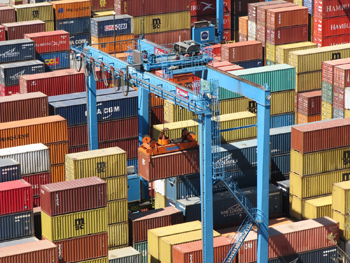
The Pipeline
From Foreign Assistance Recipient to Democratic Trading Partner
 To be clear, democratic elections are a not an instant recipe for a booming economy. But take a look at America’s trading partners, and you’ll discover that “11 of our top 15 used to be beneficiaries of U.S. foreign assistance,” as Secretary of State John Kerry emphasized during his first foreign policy speech from his new Foggy Bottom perch.
To be clear, democratic elections are a not an instant recipe for a booming economy. But take a look at America’s trading partners, and you’ll discover that “11 of our top 15 used to be beneficiaries of U.S. foreign assistance,” as Secretary of State John Kerry emphasized during his first foreign policy speech from his new Foggy Bottom perch.
Why would the Secretary of State tout this statistical success and what’s foreign assistance got to do with trade, you ask? For starters, trade, by definition, pretty much requires a trading partner, not to mention U.S. exports need some place to go (e.g., new markets).
Enter foreign assistance. Promoting rule of law, transparency, and regulatory systems in developing countries – in addition to improving things like health, education, gender equality, and more – helps to foster a more enabling environment for private sector investment and trade.
And trade supports U.S. jobs, A LOT of jobs.
In fact, the U.S. Chamber of Commerce estimates that trade supports 38 million American jobs, boiling down to more than 1 in 5 jobs right here in America anchored to international trade. Dive in a little deeper, and you’ll discover 1 in every 3 manufacturing jobs is dependent on exports and 1 in 3 acres of American farms are “planted for export.”
Trifecta of Trade, Exports, and American jobs
The coolest part about this trifecta of trade, exports, and American jobs is that it is rooted in U.S. global leadership. But let’s not forget the flip side. Failing to engage in the world can lead to disastrous results. In fact, USAID reports countries with “ineffective government institutions, rampant corruption, and weak rule of law have a 30-to-45% higher risk of civil war and higher risk of extreme criminal violence than other developing countries.”
You don’t have to be a sage to understand that such a mix does not a likely U.S. trading partner make.
But such a fate can be reversed. Take for example Colombia and our security assistance package, Plan Colombia, which included supporting the country’s “democratic pillars.” The rebel group, known as the FARC, “has been fighting to take power for a half-century.” They are, however, currently engaged in peace talks with the Colombian government, recently announcing “a major breakthrough on a complex issue — land reform.” Oh, and Colombia also is on track to hold presidential elections next year (its 3rd since 2006).
This South American country may not make the Top 15 Trading Partners List, but our exports to Colombia are up a whopping 288% since 2000 – the date Plan Colombia started. Coincidence? I doubt it, especially since May marked the one-year anniversary of the U.S.-Colombia Trade Promotion Agreement taking effect. And the results speak for themselves: exports of U.S. goods to Colombia were up 20% from the previous year alone.
Cross the Atlantic, and you find several African nations – and their leaders – that demonstrate a “link between good governance and prosperity.” For the West African country of Sierra Leone, the last few years showcase this “link” in action for a country once defined by an 11-year civil war, which “decimated the country’s infrastructure and knocked back many of its political, social, and economic development gains.”
Today’s Sierra Leone is no longer defined as “country of blood diamonds,” as President Ernest Bai Koroma described his country’s development at a recent U.S. Institute of Peace event. “Democracy and stability,” President Koroma asserted, “will open investment opportunities,” one of which came this past December in the form of eligibility to create a MCC Compact proposal.
Sierra Leone’s “hard work” and efforts “to adopt policy reforms and strengthen institutions” is also paying off economically. Home to one of the fastest growing economies in the world, the International Monetary Fund (IMF) projects Sierra Leone’s economy will grow by more than 35% this year. I can see why President Koroma believes, “Sierra Leone is on the move.”
Colombia and Sierra Leone have made significant democratic strides, but both still have a long way to go to cement their democratic reforms and ensure their people’s stability and equitable growth.
And while helping to strengthen democracies may require time, effort, and resources, standing behind our democratic values also makes for one heck of a case for the business of doing good.